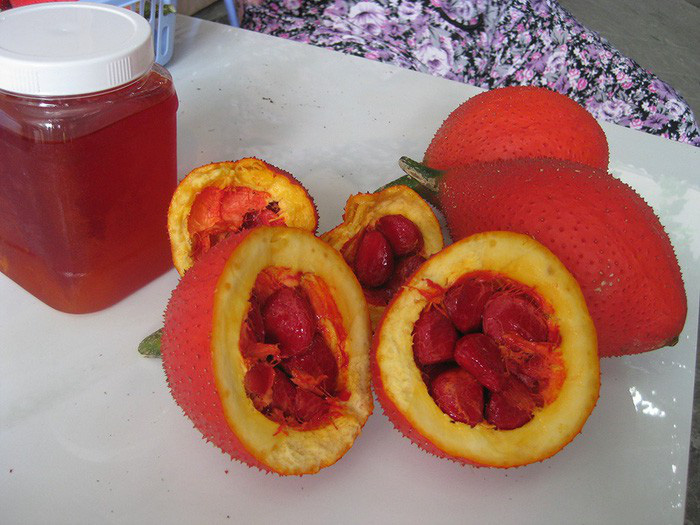She has been obsessed with the fruit, known as 'gac' in Vietnamese, since her very first encounter
Baby jackfruit, known as gac in Vietnamese, is not your ever day fruit.
According to 42-year-old Tien Huynh, an Australian-Vietnamese scientist who has a PhD, the local favorite can hold its own against cancer.
Tuoi Tre (Youth) newspaper has secured an interview with Huynh, regarding her recent findings.
The bane of cancer
Huynh had never heard of gac until a group of students she worked with offered her a taste of glutinous rice dipped in a sauce made from the fruit.
As the scientist extended her travels throughout Asia, she encountered gac ice cream in Thailand and gac with potatoes in Sri Lanka, further developing her love for its unique taste.
As her love for gac grew, so did her desire to exploit its full potential.
“Besides colorizing or seasoning cuisine, could gac be applied to medicine?” she wondered.
Hoping to discover the fruit’s hidden properties, Huynh decided to embark on a research tour through 18 Vietnamese provinces, four Thai provinces, and three Sri Lankan provinces to find the best region for growing gac.
After pinpointing the perfect growing location, she took 45-50kg of the fruit back to Australia to further study its content.
And what she found was nothing short of incredible.
Although fruits with vibrant colors typically have one or two positive effects on the human body, the doctor’s studies revealed that gac contains a dozen.
In fact, its effectiveness on human body welfare is 54 times that of carrots and 200 times that of tomatoes.
Additionally, it is able to exterminate 85-90 percent of the mass of cancerous tumors, especially skin cancer.
To top it all off, gac has properties that make it extremely versatile for cosmetic purposes.
Building the habit
In Vietnam, gac is primarily used simply as a coloring agent for steamed glutinous rice.
Now, following Huynh’s research on its anti-cancer properties, pharmaceutical companies are hoping to cash in on the discovery.
But making a quick buck seems to be the least of the doctor’s concerns.
Instead she hopes her research will help make people aware of the fruit’s miraculous usage.
“I want people to use gac in its natural state and incorporate that practice into their everyday lives,” Huynh pressed.
“Not everyone can afford expensive medicine for treating cancer.”
She also hopes her work will somehow relieve some of the financial burdens faced by Vietnamese farmers.
“They are hardworking but their returns are meager,” Huynh said.
“My research can help upgrade their cultivation methods and increase their income,” she stated.
Nguyen Cong Kha, president of the Biotechnology Center in the Mekong Delta province of An Giang, holds the recent findings by Huynh in high esteem.
The natural property of gac, as he implied, is suitable for anyone, which can in turn increase the income of Vietnamese farmers in the trade as it grows in popularity.
Nguyen Thi Dao, an instructor at Tay Nguyen University in the Central Highlands, also revealed that Huynh is very passionate and approachable to her Vietnamese peers.
Nothing is dispensable
According to researchers, several other fruits and berries in Vietnam could contain significant medical properties.
“Take coffee for example: its mashed case can elevate the healing process on human skin or be amalgamated with asphalt to reduce the expansion rate of roadways in hot temperatures," Huynh said.
There is only one occasion in the Mekong Delta city of Can Tho in southern Vietnam, where Huynh witnessed the application of coir yarn in real life situations.
Typically, coir yarn is thrown away, but it can also be used in construction to lower costs.
Additionally, coir yarn is essential in the construction of biogas chambers.
“I just wish people could use it to its full potential,” Huynh remarked.
Upon being asked about her life as a Vietnamese on Australian soil, Huynh just batted it off with a laugh.
“I migrated there with my family at a young age, so there’s no culture gap,” she said.
“When I grew up a bit, I got to do lots of chores and odd jobs around. They helped me accumulate tons of experience.
“Now that my feathers have grown into full-scale wings, nothing scares me anymore, I suppose,” Huynh giggled.
Superstar of STEM
After earning her bachelor’s degree from RMIT University in Australia in1999, Huynh achieved the doctorate scholarship in phylogenetics at the University of Melbourne.
She has held positions at the Royal Botanics Gardens of Kew in England and the University Degli Studi di Napoli Federico II in Italy. Huynh also serves as an instructor at RMIT University in Australia.
She was the sole female Vietnamese Australian to surpass more than 300 heavy contenders in receiving the “2017 Superstar of STEM” award from Science and Technology Australia, a prominent research society in the country.
Huynh refuses to limit her scope of research to any specific field.
Rather, she conquers all – be it alternative medicine, environmental science, materials science, cancer, and diabetes.
Discovering the anti-cancer property in gac fruit is her most outstanding feat yet.
In the future, she plans to put together a team of Vietnamese students to study the possible wound healing properties of cacao and coffee.
























































